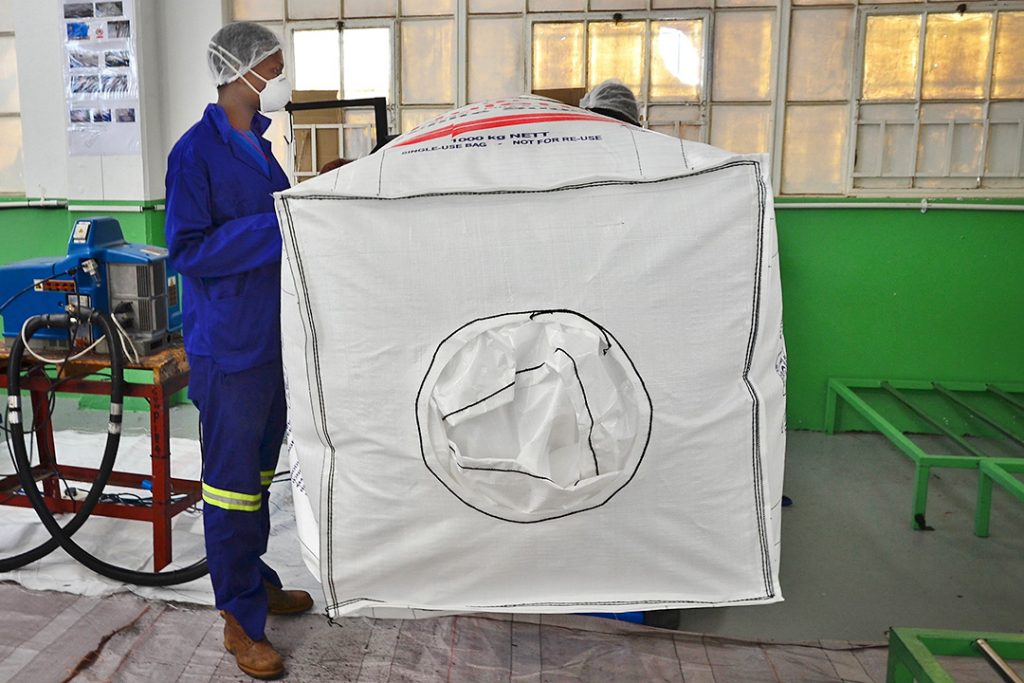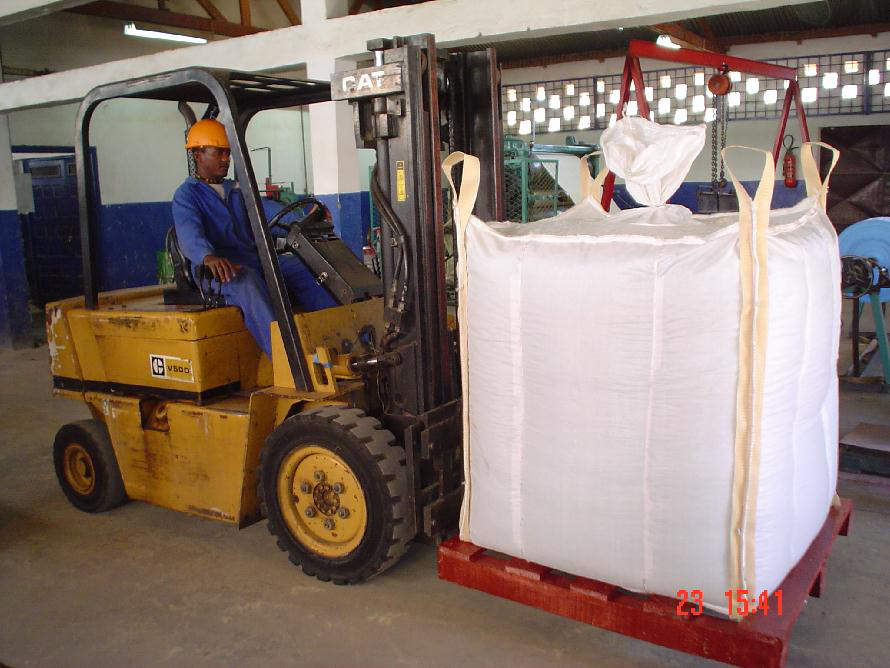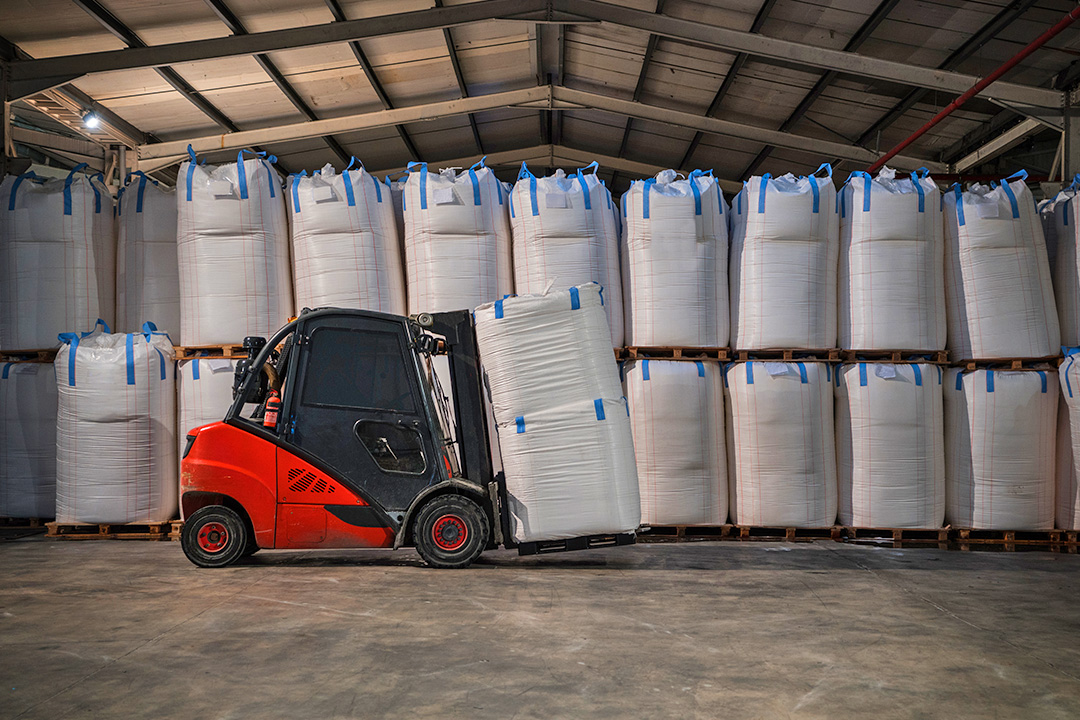Flexible intermediate bulk containers, or FIBCs as they are commonly known, are used in the logistics of bulk materials. These bulk bags are a cost-effective way to store and ship goods destined for industries such as agriculture, construction and mining. Grains, seeds and nuts are a few examples of food items that can be stored and transported in FIBCs.
Bulk materials can be difficult to weigh accurately, so there is a danger of overloading FIBCs. There are a number of safety concerns associated with bags that exceed their safe working load (SWL). Bags might break while in transit and this can result in staff getting injured. Bags that are not filled correctly can topple over or tear. Goods stored inside FIBCs can be compromised or contaminated if there is damage to the external fabric of the packaging.
Different warehouses have their own ways of transporting FIBCs, although it is generally done using a forklift. The lifting device is used to facilitate the filling and emptying of FIBCs. This equipment lifts, suspends and then lowers the FIBCs during this process. Clearly, there are safety risks associated with lifting a bag that weighs around 1000 kilograms.
Safety is really important to us. We’d like to make our customers aware of how to stay within the SWL of their bulk bags to ensure that both their personnel and their goods are safe. Custom Bulk Bags (CBB) manufactures FIBCs with a minimum 5:1 safety factor, which means that our bags can safely carry at least five times their intended load without breaking. However, this does not mean that you should always fill the FIBCs with more weight than their SWL.
The safe working load of a FIBC

FIBCs are designed to have an SWL – this is the standard weight that a bulk bag can hold and acts as a guideline for handlers filling and transporting the bags. A typical SWL ranges between 500kg and 2000kg. At CBB, we work with our customers to design and produce bags that meet their specific requirements.
Bulk bags are made from woven polypropylene. This is one of the lightest and most durable thermoplastics currently available. FIBCs weigh between two and three kilograms, depending on their design and size. Despite being extremely lightweight, these bags can hold many times their own weight. Bulk bags have the highest packaging-to-product weight ratio of any bulk container on the market.
To ensure that these bags can hold bulk goods without breaking, hydraulic testing is done to calculate their SWL. During peak load testing, the maximum weight that a bag can hold is determined. There are a few variables that make a difference to the SWL, namely the thickness of the fabric used, the width of the lifting loops and whether the bag has been manufactured to specific specifications.
Some manufacturers give details about both the SWL and the safety factor of a bag. The safety factor is the ratio of how much the bag can safely hold before breaking. For example, if a bag has been tested to hold a mass that is five times heavier than its recommended weight, it will have a safety factor of 5:1. In other words, the bag is designed to hold 1000 kg but in testing, it holds 5000 kg before breaking.
How to stay within the SWL of a FIBC

It is important to know what the SWL and safety factor are before putting a FIBC to use. It is also important to note that some bulk bags are designed for single use. Even if they still seem to be in good condition after being used, they should be recycled or discarded. Most of CBB’s products can be safely reused and reconditioned, however, if you notice any signs of wear and tear, then it is best to recycle the FIBC.
Bulk bags need to be inspected before being put back into circulation. If a bag breaks, it can be very dangerous, causing death or injury to staff and damage to machinery and equipment. It is important to never exceed the recommended maximum SWL for these reasons. Weighing a filled bag is one way to stay within the SWL.
Most warehouses have equipment with built-in scales. Palette wrappers or industrial scales can be used to weigh the filled bulk bags. Similarly, the equipment used to fill the bags has scales that can give accurate readings of weight as the FIBC is being filled.
Choosing the right FIBC
Another way to make sure that you stay within the SWL of a FIBC is to determine the cubic weight of the goods you intend to put inside the bulk bags. This will help you to determine whether the bulk bag can be filled all the way to the top, or whether this will lead to excessive weight.
Let’s compare the weight of different goods to see how much a bulk bag can hold. Our first customer runs a construction company. She wishes to transport sand to a building site using FIBCs. A cubic metre of sand weighs 1600 kg. This means that she should only fill the bags to 60% capacity in order to stay within the SWL of 1000 kgs.
Our next customer wishes to transport grain to their farm for animal feed. Grain weighs 790 kg per cubic metre. They opted for a one cubic metre bulk bag, so it is safe to fill the bag to the top and stay within the SWL. As we can see from these two examples, the weight of the goods will also determine how each customer can stay within the SWL of their FIBC.
CBB is able to give details on the SWL of each bulk bag and how to use them correctly. Never overfill a FIBC and always inspect them for signs of stress and damage before lifting and transporting. For more information about our bulk bags, please contact us today.
___
Custom Bulk Bags is a leading South African manufacturer of woven polypropylene bags for various industries, such as mining, chemicals and food. We are able to produce over 3.5-million bulk bags per year, keeping our customers in-stock at all times. Our bags adhere to the highest levels of quality as a result of our stringent in-house testing and quality control programmes.
Custom Bulk Bags holds ISO 9001 certification and we currently have a number of UN-certified designs. We are a Level 3 B-BBEE manufacturer and supplier and fall under the ownership structure of Deneb Investments Limited. For more information on our products, contact sales@custombulkbags.co.za. Follow us on Facebook for our latest news and industry insights.

